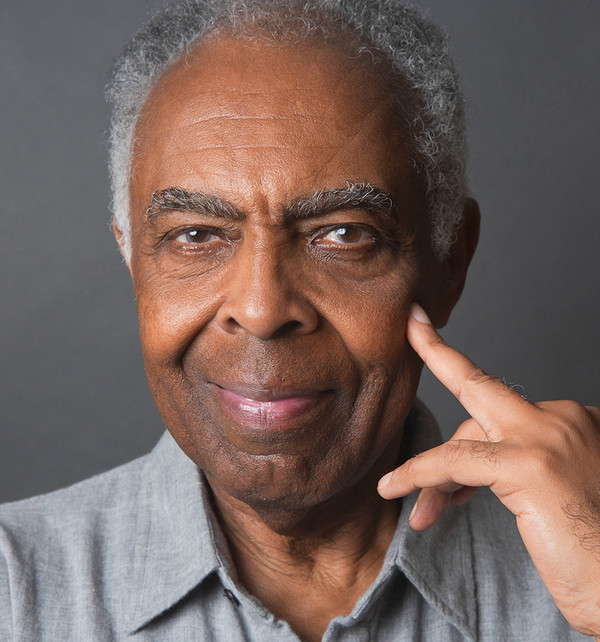Salvador (Brasil), 1942
By Adriana Veríssimo
Singer, composer, and politician, Gilberto Gil spent part of his childhood in Ituaçu, in the interior of Bahia. In the late 1950s, he was part of the musical group Os Desafinados as an accordionist. At that time, João Gilberto and bossa nova, a musical genre that introduced a new way of playing samba influenced by jazz, were an important reference for the artist.
In 1961, he began studying business administration at the University of Bahia and adopted the guitar as his instrument. Two years later, he recorded his debut album, Gilberto Gil: sua música, sua interpretação, a double single with four songs he wrote, released by JS Discos. At that time, he met Caetano Veloso.
In 1964, alongside Maria Bethânia, Gal Costa, Tom Zé, and others, he presented the show Nós, por exemplo, which inaugurated the Vila Velha Theater in Salvador. He completed his business administration degree and moved to São Paulo the following year to work as an intern at Gessy Lever. There, he met Chico Buarque and collaborated with lyricists Capinan and Torquato Neto. Along with Caetano, Gal, Bethânia, and Tom Zé, he participated in Arena canta Bahia, a show directed by Augusto Boal and staged at the Brazilian Comedy Theater (TBC) in São Paulo.
The next year, he was signed by Philips to record his first LP. He left his job at Gessy Lever and moved to Rio de Janeiro. He appeared on programs such as Fino da Bossa, hosted by Elis Regina on TV Record. He competed as a composer in the 1st International Song Festival in Rio de Janeiro with “Minha senhora,” a partnership with Torquato Neto, performed by Gal Costa. At the 2nd Brazilian Popular Music Festival on TV Record in São Paulo, he placed fifth with the song “Ensaio geral,” sung by Elis Regina.
In 1967, he was hired by TV Excelsior in São Paulo to host the program Ensaio Geral. He recorded his first LP, Louvação. He participated in the 3rd Brazilian Popular Music Festival on TV Record, where his song “Domingo no parque,” accompanied by the band Os Mutantes, came in second place. At the end of the 1960s, Tropicalism emerged, an avant-garde movement in Brazilian popular music that included Gil, Caetano Veloso, Torquato Neto, Capinan, Tom Zé, Gal Costa, and arrangers Rogério Duprat, Júlio Medaglia, and Damiano Cozzella. The milestone of this movement was the LP Tropicália ou panis et circensis, released in 1968. That same year, with the enactment of Institutional Act No. 5 by the military dictatorship, Gil and Caetano were detained for two months in an army barracks. After their release, they traveled to London.
When he returned from exile, Gil released the LP Expresso 2222 in 1976. In 1978, he participated in the famous Montreux Festival. In 1979, he released the LP Realce, which included the song “Não chore mais,” a version of Bob Marley’s “No woman, no cry.” His first international album, Nightlife, produced by Sérgio Mendes, was released in the United States.
Always interested in politics, he was elected councilor in Salvador in 1988, the same year he published the book O poético e o político. He is an active member of the Green Party and founded the Onda Azul Foundation. He composed the soundtracks for the films Quilombo (1984), by Carlos Diegues; Jubiabá (1986), by Nelson Pereira dos Santos; and Um trem para as estrelas (1987), by Diegues.
In the 1990s, he was honored by the 10th Shell Brazilian Music Award for his body of work. He released the album Parabolicamará and, in 1993, with Caetano Veloso, Tropicália 2, to celebrate 25 years of Tropicalism. In 1997, he released the album Quanta, which won the Grammy Award for Best World Music Album. In 2000, he collaborated for the first time with Milton Nascimento in the show and CD Milton e Gil, released in Brazil, Europe, and the United States. That same year, he composed the soundtrack for the film Eu, Tu, Eles by Andrucha Waddington, based on the work of Luiz Gonzaga.
He served as Minister of Culture from 2003 to 2008. During his tenure, he facilitated projects to value ethnic communities, especially Afro-Brazilian ones. He reactivated Funarte, encouraged circus productions, and created the Caravan of Performing Arts, which brought theater and dance companies to over five hundred Brazilian cities. His administration institutionalized a policy promoting the socialization of new technologies. He created the Points of Culture program to foster forms of popular culture. In 2015, he celebrated 50 years of artistic career. He is married to Flora Gil, with whom he has three children, in addition to five children from previous marriages to Belina de Aguiar and Sandra Gadelha.




